-
 Bitcoin
Bitcoin $82,666.6102
-0.79% -
 Ethereum
Ethereum $1,784.7960
-1.02% -
 Tether USDt
Tether USDt $0.9996
0.02% -
 XRP
XRP $2.1257
-0.64% -
 BNB
BNB $592.3902
-0.42% -
 USDC
USDC $0.9999
0.02% -
 Solana
Solana $117.4685
-1.68% -
 Dogecoin
Dogecoin $0.1672
-1.55% -
 Cardano
Cardano $0.6486
-2.86% -
 TRON
TRON $0.2388
-0.62% -
 Chainlink
Chainlink $12.6264
-1.48% -
 UNUS SED LEO
UNUS SED LEO $8.9748
-4.45% -
 Toncoin
Toncoin $3.2369
-5.07% -
 Stellar
Stellar $0.2523
-3.16% -
 Avalanche
Avalanche $17.8476
-2.45% -
 Shiba Inu
Shiba Inu $0.0...01211
-1.64% -
 Sui
Sui $2.1892
-2.55% -
 Hedera
Hedera $0.1597
-3.77% -
 Litecoin
Litecoin $82.3531
-1.88% -
 Polkadot
Polkadot $3.9109
-4.55% -
 MANTRA
MANTRA $6.2589
-1.98% -
 Bitcoin Cash
Bitcoin Cash $297.7127
-1.02% -
 Dai
Dai $1.0001
0.04% -
 Bitget Token
Bitget Token $4.4351
-2.15% -
 Ethena USDe
Ethena USDe $0.9991
-0.03% -
 Pi
Pi $0.6450
21.59% -
 Monero
Monero $216.0365
0.55% -
 Hyperliquid
Hyperliquid $11.4792
-0.63% -
 Uniswap
Uniswap $5.8107
-0.91% -
 OKB
OKB $50.4811
4.99%
What is the social media influence of the NFT market?
Social media has transformed the NFT market by driving discovery, building communities, and influencing prices through trends and influencer marketing.
Apr 04, 2025 at 08:35 am
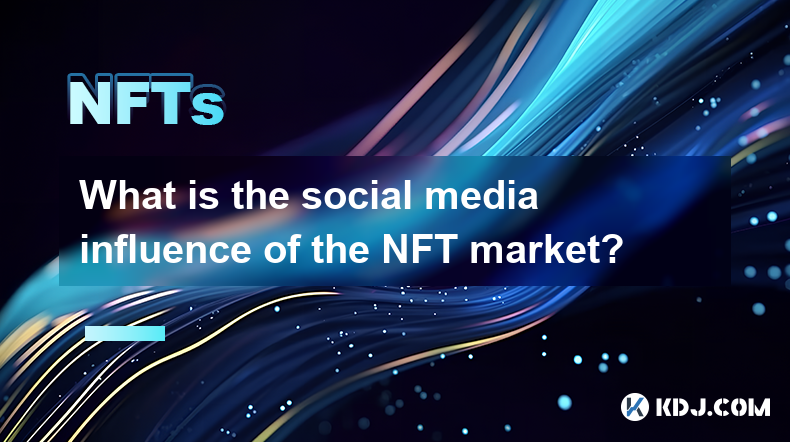
The NFT market has significantly influenced social media platforms, transforming how digital assets are perceived and interacted with. Non-fungible tokens (NFTs) have become a popular topic on social media, driving discussions, trends, and even the creation of new communities. This influence is evident in the way users engage with NFTs, from sharing their latest purchases to discussing market trends and upcoming drops. Social media platforms like Twitter, Instagram, and Discord have become essential tools for NFT creators and collectors to connect, share information, and build networks. The rise of NFTs has also led to the emergence of influencer marketing within the space, where key figures drive interest and engagement.
The Role of Social Media in NFT Discovery
Social media plays a crucial role in the discovery of new NFTs. Platforms like Twitter and Instagram allow creators to showcase their work to a broad audience, often leading to viral trends. For instance, when a new NFT project is announced, creators use social media to generate buzz and attract potential buyers. Hashtags such as #NFT and #CryptoArt help users find and engage with content related to NFTs. Additionally, social media algorithms favor content that generates high engagement, which means that popular NFT posts can reach a vast audience quickly. This dynamic has made social media an essential tool for both creators and collectors in the NFT market.
Building Communities Around NFTs
The NFT market has fostered the growth of dedicated communities on social media. Platforms like Discord and Telegram have become hubs for NFT enthusiasts to discuss their interests, share tips, and collaborate on projects. These communities often revolve around specific NFT projects or broader themes within the NFT space. For example, the Bored Ape Yacht Club has a thriving community on Discord where members share their experiences and discuss the latest developments. These communities not only enhance the social aspect of NFTs but also contribute to their value by creating a sense of belonging and exclusivity among members.
Influencer Marketing in the NFT Space
Influencer marketing has become a significant part of the NFT market's social media presence. Influencers with large followings on platforms like Twitter and Instagram can drive significant interest in NFT projects. When an influencer promotes an NFT, it often leads to increased visibility and sales. For instance, celebrities like Paris Hilton and Snoop Dogg have been known to promote NFTs, leveraging their social media reach to attract new buyers. This form of marketing can be particularly effective in the NFT space, where the perceived value of an asset can be influenced by social proof and the endorsement of well-known figures.
The Impact of Social Media on NFT Prices
Social media can have a direct impact on NFT prices. When an NFT gains traction on social media, it often leads to increased demand and higher prices. For example, if a tweet about a new NFT project goes viral, it can result in a surge of interest and a subsequent increase in its market value. Conversely, negative sentiment on social media can lead to a decrease in an NFT's value. This dynamic highlights the importance of social media management for NFT creators and collectors, as maintaining a positive online presence can significantly influence the success of their projects.
Social Media as a Tool for NFT Education
Social media platforms have become vital tools for educating the public about NFTs. Many influencers and creators use platforms like YouTube and Twitter to share tutorials, explainers, and insights into the NFT market. This educational content helps demystify NFTs for newcomers and provides valuable information for experienced collectors. For example, channels like NFT Explained on YouTube offer detailed guides on how to buy, sell, and understand NFTs. This educational role of social media is crucial for the continued growth and mainstream adoption of NFTs, as it helps to build a knowledgeable and engaged community.
The Role of Social Media in NFT Events and Drops
Social media is also instrumental in organizing and promoting NFT events and drops. Creators often use platforms like Twitter to announce upcoming NFT drops, providing details on timing, pricing, and how to participate. These announcements can generate significant buzz and anticipation within the NFT community. Additionally, social media platforms enable live events, such as Twitter Spaces, where creators can interact with their audience in real-time, answer questions, and build excitement around their projects. This direct engagement is essential for fostering a sense of community and driving interest in new NFTs.
The Influence of Social Media Trends on NFT Creation
Social media trends significantly influence the creation of new NFTs. Creators often draw inspiration from what is popular on platforms like TikTok and Instagram, tailoring their NFTs to align with current trends. For instance, the rise of meme culture on social media has led to the creation of meme-inspired NFTs, which have gained popularity among collectors. By staying attuned to social media trends, creators can produce NFTs that resonate with their audience and increase their chances of success in the market. This trend-following approach highlights the symbiotic relationship between social media and the NFT market.
The Challenges of Social Media in the NFT Market
While social media has brought many benefits to the NFT market, it also presents challenges. One significant issue is the prevalence of scams and misinformation. Social media platforms can be breeding grounds for fraudulent schemes, where scammers promote fake NFTs or promise unrealistic returns. This can lead to financial losses for unsuspecting buyers and damage the reputation of the NFT market as a whole. Additionally, the fast-paced nature of social media can create pressure for creators to constantly produce new content, which can lead to burnout and a decline in the quality of NFTs. Addressing these challenges requires vigilance and education within the NFT community.
The Future of Social Media and NFTs
The future of social media and NFTs is likely to be intertwined, with continued growth and innovation in both fields. As social media platforms evolve, they may introduce new features specifically designed for NFT creators and collectors, such as integrated marketplaces or enhanced verification systems. Additionally, the rise of the metaverse and virtual reality could further enhance the role of social media in the NFT market, allowing for more immersive and interactive experiences. As the NFT market continues to mature, social media will remain a critical tool for discovery, community building, and marketing, shaping the future of digital assets.
Common Questions Related to Social Media Influence on the NFT Market
Q: How does social media help in discovering new NFTs?
- Social media platforms like Twitter and Instagram allow creators to showcase their work to a broad audience, often leading to viral trends. Hashtags such as #NFT and #CryptoArt help users find and engage with content related to NFTs. Social media algorithms favor content that generates high engagement, enabling popular NFT posts to reach a vast audience quickly.
Q: What role do communities play in the NFT market on social media?
- Communities on platforms like Discord and Telegram are central to the NFT market, fostering discussions, sharing tips, and collaborating on projects. These communities often revolve around specific NFT projects or broader themes within the NFT space, enhancing the social aspect of NFTs and contributing to their value through a sense of belonging and exclusivity.
Q: How does influencer marketing impact the NFT market?
- Influencer marketing significantly impacts the NFT market by driving interest and engagement. Influencers with large followings on platforms like Twitter and Instagram can increase visibility and sales for NFT projects. Celebrity endorsements, such as those from Paris Hilton and Snoop Dogg, can leverage their social media reach to attract new buyers and influence the perceived value of NFTs.
Q: Can social media affect NFT prices?
- Yes, social media can directly impact NFT prices. When an NFT gains traction on social media, it often leads to increased demand and higher prices. Conversely, negative sentiment can decrease an NFT's value. Maintaining a positive online presence is crucial for managing the success of NFT projects.
Q: How does social media contribute to NFT education?
- Social media platforms are vital for educating the public about NFTs. Influencers and creators use platforms like YouTube and Twitter to share tutorials, explainers, and insights into the NFT market. This educational content helps demystify NFTs for newcomers and provides valuable information for experienced collectors.
Q: What role does social media play in NFT events and drops?
- Social media is instrumental in organizing and promoting NFT events and drops. Creators use platforms like Twitter to announce upcoming drops, generate buzz, and provide details on participation. Live events like Twitter Spaces enable real-time interaction, fostering community and driving interest in new NFTs.
Q: How do social media trends influence NFT creation?
- Social media trends significantly influence NFT creation. Creators often draw inspiration from popular trends on platforms like TikTok and Instagram, tailoring their NFTs to align with current trends. This trend-following approach highlights the symbiotic relationship between social media and the NFT market.
Q: What challenges does social media present to the NFT market?
- Social media presents challenges such as the prevalence of scams and misinformation, which can lead to financial losses and damage the NFT market's reputation. The fast-paced nature of social media can also create pressure for creators, leading to burnout and a potential decline in NFT quality. Addressing these challenges requires vigilance and education within the NFT community.
Q: What is the future of social media and NFTs?
- The future of social media and NFTs is likely to be intertwined, with continued growth and innovation. Social media platforms may introduce new features for NFT creators and collectors, such as integrated marketplaces or enhanced verification systems. The rise of the metaverse and virtual reality could further enhance the role of social media in the NFT market, allowing for more immersive experiences.
Disclaimer:info@kdj.com
The information provided is not trading advice. kdj.com does not assume any responsibility for any investments made based on the information provided in this article. Cryptocurrencies are highly volatile and it is highly recommended that you invest with caution after thorough research!
If you believe that the content used on this website infringes your copyright, please contact us immediately (info@kdj.com) and we will delete it promptly.
- These Dogecoin Levels Stand Out In Terms Of On-Chain Resistance
- 2025-04-05 23:20:12
- Mastercard Expands Blockchain Integration with New Digital Asset Initiatives
- 2025-04-05 23:20:12
- Digital Asset Global Competition and Korea's Strategy Forum Held
- 2025-04-05 23:15:12
- BTC Bull Token (BTCBULL) Completes Its Presale Raising $4.3M From Investors
- 2025-04-05 23:15:12
- Decoding the Digital Tapestry of the BNBUSD Trading Pair
- 2025-04-05 23:10:12
- Multi-Token Attention (MTA) Enables Efficient Retrieval of Contextual Information
- 2025-04-05 23:10:12
Related knowledge
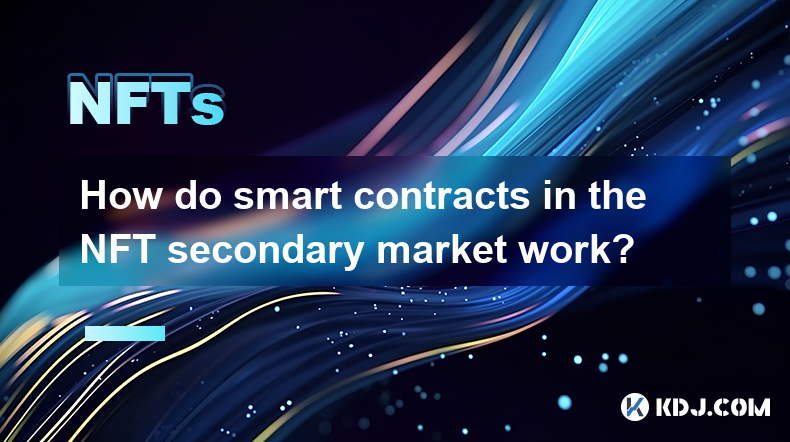
How do smart contracts in the NFT secondary market work?
Apr 03,2025 at 07:14am
Smart contracts play a pivotal role in the NFT secondary market, facilitating seamless transactions and enforcing predefined rules. These self-executing contracts with the terms of the agreement directly written into code are stored on the blockchain. In the context of NFTs, smart contracts automate the buying, selling, and transferring of digital asset...
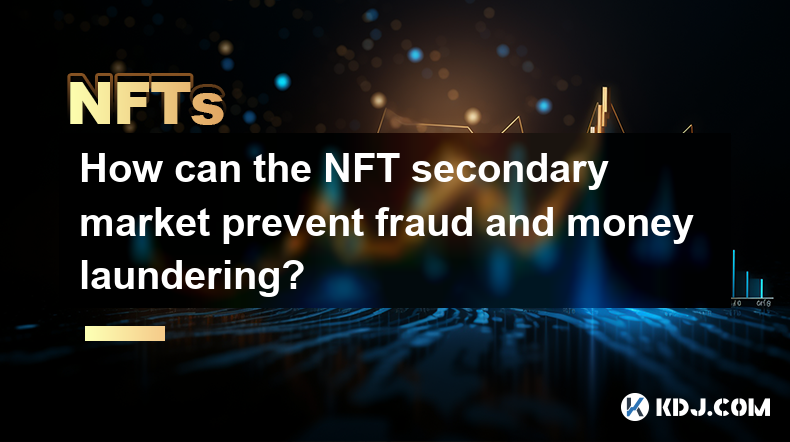
How can the NFT secondary market prevent fraud and money laundering?
Apr 03,2025 at 08:35am
The NFT secondary market has become a thriving hub for digital art and collectibles, but it also faces challenges in preventing fraud and money laundering. To tackle these issues, the market can implement various strategies and technologies to ensure a safer and more transparent trading environment. This article will explore how the NFT secondary market...
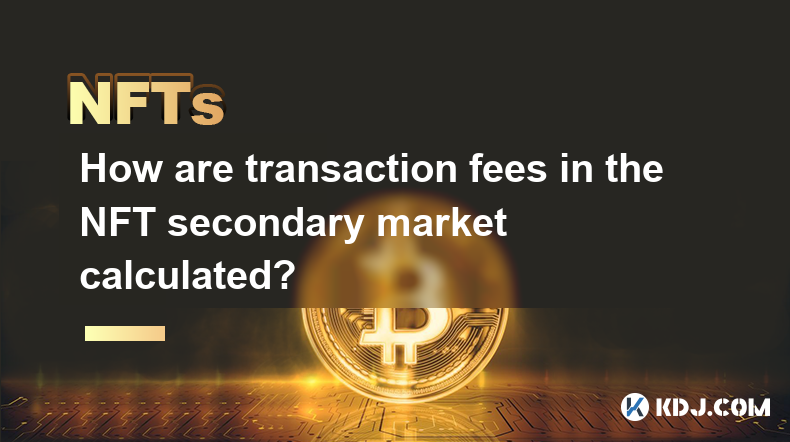
How are transaction fees in the NFT secondary market calculated?
Apr 04,2025 at 05:28am
The calculation of transaction fees in the NFT secondary market is a crucial aspect that both buyers and sellers need to understand. These fees can significantly impact the overall cost of transactions and the profits that sellers can make. In this article, we will delve into the various components that make up these fees, how they are calculated, and w...
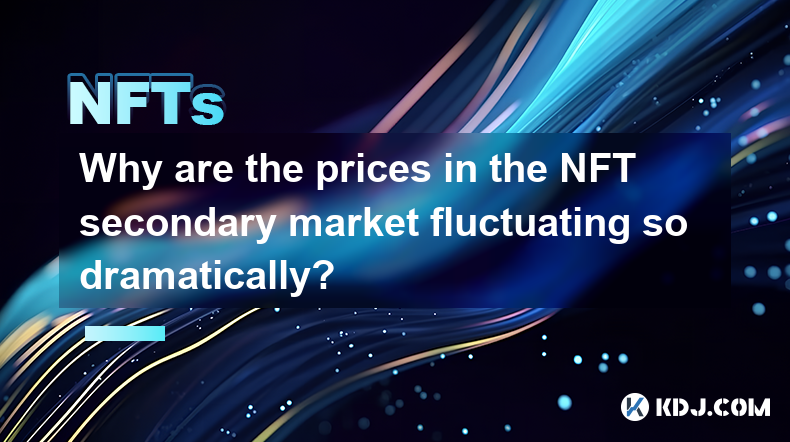
Why are the prices in the NFT secondary market fluctuating so dramatically?
Apr 03,2025 at 10:35pm
The NFT secondary market has been experiencing dramatic price fluctuations, leaving many in the cryptocurrency community puzzled and curious. To understand this phenomenon, it's essential to delve into the factors driving these price movements. From the impact of market sentiment and celebrity endorsements to the role of speculation and the unique natur...
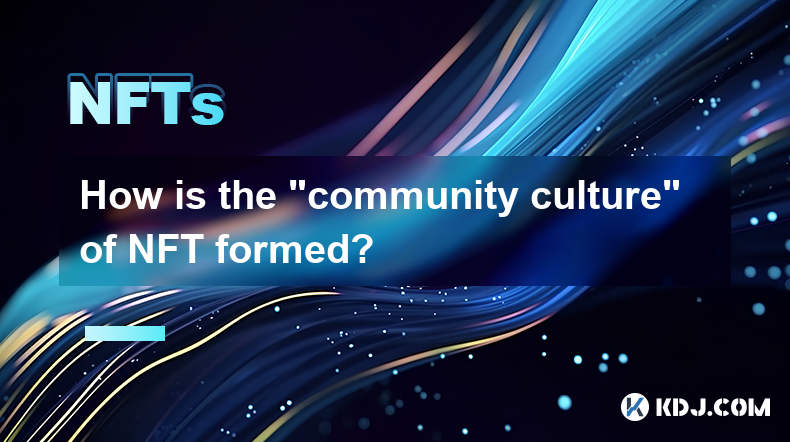
How is the “community culture” of NFT formed?
Apr 03,2025 at 11:07am
The formation of the 'community culture' within the NFT (Non-Fungible Token) space is a fascinating and multi-faceted process. It involves various elements such as shared interests, active engagement, and the creation of a sense of belonging among members. NFT communities often revolve around specific projects or artists, fostering a unique environment ...
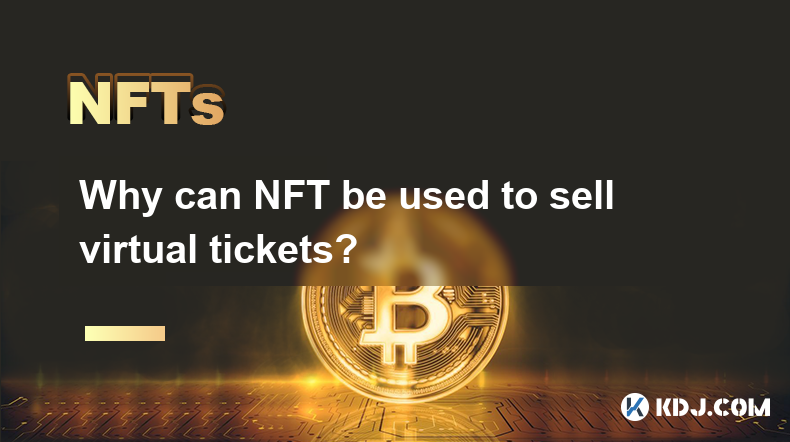
Why can NFT be used to sell virtual tickets?
Apr 03,2025 at 01:35pm
NFTs, or Non-Fungible Tokens, have revolutionized the way we think about digital ownership and value, particularly in the realm of virtual tickets. The primary reason NFTs can be used to sell virtual tickets is their unique nature. Unlike cryptocurrencies such as Bitcoin or Ethereum, which are fungible and can be exchanged on a one-to-one basis, NFTs ar...

How do smart contracts in the NFT secondary market work?
Apr 03,2025 at 07:14am
Smart contracts play a pivotal role in the NFT secondary market, facilitating seamless transactions and enforcing predefined rules. These self-executing contracts with the terms of the agreement directly written into code are stored on the blockchain. In the context of NFTs, smart contracts automate the buying, selling, and transferring of digital asset...

How can the NFT secondary market prevent fraud and money laundering?
Apr 03,2025 at 08:35am
The NFT secondary market has become a thriving hub for digital art and collectibles, but it also faces challenges in preventing fraud and money laundering. To tackle these issues, the market can implement various strategies and technologies to ensure a safer and more transparent trading environment. This article will explore how the NFT secondary market...

How are transaction fees in the NFT secondary market calculated?
Apr 04,2025 at 05:28am
The calculation of transaction fees in the NFT secondary market is a crucial aspect that both buyers and sellers need to understand. These fees can significantly impact the overall cost of transactions and the profits that sellers can make. In this article, we will delve into the various components that make up these fees, how they are calculated, and w...

Why are the prices in the NFT secondary market fluctuating so dramatically?
Apr 03,2025 at 10:35pm
The NFT secondary market has been experiencing dramatic price fluctuations, leaving many in the cryptocurrency community puzzled and curious. To understand this phenomenon, it's essential to delve into the factors driving these price movements. From the impact of market sentiment and celebrity endorsements to the role of speculation and the unique natur...

How is the “community culture” of NFT formed?
Apr 03,2025 at 11:07am
The formation of the 'community culture' within the NFT (Non-Fungible Token) space is a fascinating and multi-faceted process. It involves various elements such as shared interests, active engagement, and the creation of a sense of belonging among members. NFT communities often revolve around specific projects or artists, fostering a unique environment ...

Why can NFT be used to sell virtual tickets?
Apr 03,2025 at 01:35pm
NFTs, or Non-Fungible Tokens, have revolutionized the way we think about digital ownership and value, particularly in the realm of virtual tickets. The primary reason NFTs can be used to sell virtual tickets is their unique nature. Unlike cryptocurrencies such as Bitcoin or Ethereum, which are fungible and can be exchanged on a one-to-one basis, NFTs ar...
See all articles




















































































